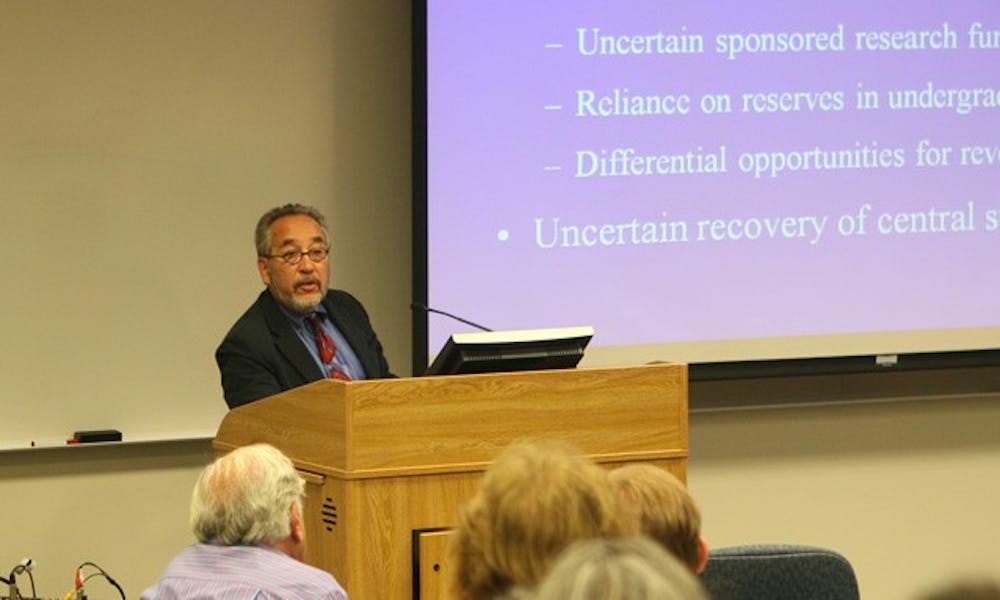Top administrators expressed confidence Thursday that the University will be able to eliminate its remaining $40 million budget deficit in the next two years.
Provost Peter Lange and Executive Vice President Tallman Trask provided faculty members with an update on the University’s financial climate at the first Academic Council meeting of the Fall semester. Most of the presentation re-emphasized information President Richard Brodhead sent by e-mail to faculty and staff Wednesday regarding the state of the endowment and budget deficit.
The administrators reported that the endowment saw a 13.2 percent return for fiscal year 2009-2010, which ended June 30, and that the University still has to cut about $40 million.
“It is important that it is a better outcome than we anticipated because all of the budget cuts that we anticipate are based on projections,” Lange said regarding the positive endowment return.
Donations to the University increased by 15 percent from last year to $345 million, which Lange called a “partial recovery of fund-raising.” Most giving, however, came from one-year cash returns and not long-term pledges, Lange added.
Since implementing budget reforms last year, the University has reduced its annual budget by about $60 million, largely through employee attrition and the elimination of some non-salary expenses. To date, the University has eliminated the equivalent of around 392 positions—mostly from central administrative units—since last year and has saved about $32.3 million in scaling back non-salary expenses, Trask said. He added that the number of positions eliminated will be the equivalent of 400 to 425 “when all settles out.”
There is some good news for faculty members, however. Administrators have plans to make a modest salary increase in the next fiscal year, according to Brodhead’s Wednesday e-mail.
But this year individual schools will face tight budgets, with a flat annual spending distribution from the long-term pool.
And as faculty members leave the University, many of their positions will not be refilled—especially in the Trinity College of Arts and Sciences. Lange said Trinity will need to see an attrition of 20 to 30 positions—which is less than 5 percent of its current 645 regular rank faculty members.
“Had we not encountered the recession, the stress on the Arts and Sciences budget due to the size of the faculty would have been substantial,” Lange said. “But with the downturn of the economy... it became worse.”
Because of the large faculty size, Lange said the University will have to launch fewer faculty searches this year. Last year Duke conducted 58 searches, whereas this year it will run about 50.
“The principal reason that number is going down is because we will be running fewer searches in Arts and Sciences,” Lange said.
Trinity has seen an average of 3 percent annual faculty growth since the 2005-2006 academic year—the second-highest annual growth rate behind the Sanford School of Public Policy, which Lange noted has grown significantly because it transitioned from an institute to a school in July 2009.
Trask added that administrators plan to start an eProcurement program in January to automate the way the University purchases equipment and other “stuff.” The University currently spends $650 million per year on such expenditures, Trask said, adding that reducing that cost with eProcurement programming by 5 percent would save the University $30 million per year.
In accordance with other Duke Administrative Reform Team initiatives that strive to find excesses in the budget, the University is close to eliminating paper from the payroll process, Trask said.
“We are convinced there is still enough room to say that we can get the $40 million out of the budget,” he said.
In other business:
Council members voted to change the Academic Council election by allowing the election committee to either list all faculty members eligible to serve on the council or list the subset of faculty members who express that they want to serve.
“Our hope is to collect the names of those that are interested and make that the nominating ballot,” said Chair Craig Henriquez, professor of biomedical engineering. “But we did not want to tie the hands of future Academic Council chairs... if it gets to the point where nobody chooses to self nominate, we are going to have a problem, so we like the flexibility.”
Henriquez also discussed some of the topics the Council will address throughout the year. The Council is expected to approach issues such as Duke’s global strategy, the face of Undergraduate Education, salary equity and faculty diversity. The Council may also discuss a June report from the Knight Commission, which called for college athletics reform in light of increasing athletic spending.
Get The Chronicle straight to your inbox
Signup for our weekly newsletter. Cancel at any time.

